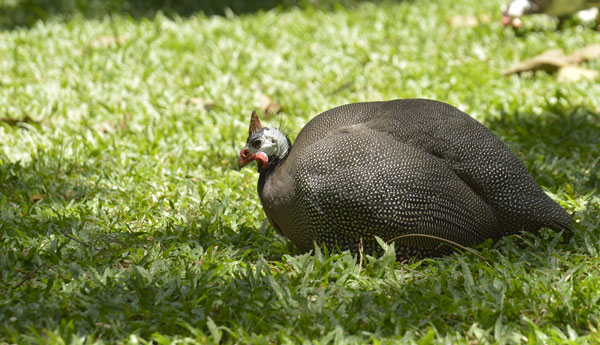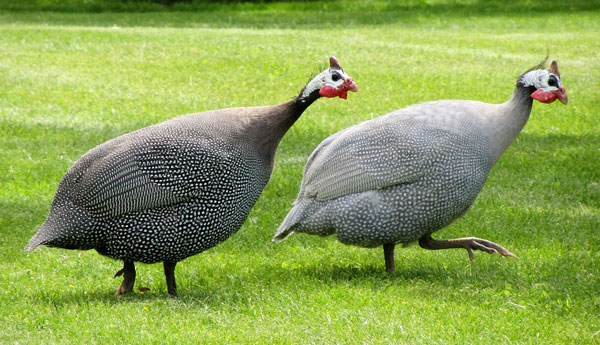 Welcome to Current Homesteading, your resource for all things related to your homestead. From gardening to guinea hens and fencing to fish, we will cover it all. For our inaugural article, let’s kick it off with one of the topics mentioned above: guinea hens. This week, we’ll discuss specifically why you may want to consider keeping a flock of these loquacious fowl—next week, we’ll follow up with the particulars on how to care for them.
Welcome to Current Homesteading, your resource for all things related to your homestead. From gardening to guinea hens and fencing to fish, we will cover it all. For our inaugural article, let’s kick it off with one of the topics mentioned above: guinea hens. This week, we’ll discuss specifically why you may want to consider keeping a flock of these loquacious fowl—next week, we’ll follow up with the particulars on how to care for them.
Few people know much about guinea hens, and those who do often mistake them for merely ornamental avians. Ask any old farmer with a flock, however, and you’ll find they are far more than that. In fact, guinea hens can act as everything from pastoral pest control to barnyard bodyguards, and have done so since their introduction to the North American continent by some of the first settlers. Indeed, their utilitarian history with humankind extends even further than that, with some evidence even being found of their domestication in 5th-century-B.C. Greece.
Pest Control
Guinea hens have a voracious appetite, and will eat everything from vegetation, to insects, to rodents, to small snakes. An intensely social animal, guinea hens are pack hunters, and will march in military-style lines through a field, devouring anything on their expansive menu of edibles. Should they find one of the larger treats on their menu such as a rodent or snake, for instance, they will close ranks, then kill and devour it as a collective. As such, guinea hens can be useful for deterring small rodents, and even more dangerous unwanted pests like copperheads.
No slackers, guinea hens will be quick to fill the insect-controlling void left behind by any rodents they run off. Many a crop has been saved by guineas’ love of potato bugs, grasshoppers and beetles of all kinds. Further, if you happen to live in one of the 41 states currently inhabited by the brown marmorated stink bug (much less one of the six absolutely infested by them), you’ll be happy to know the birds devour them like popcorn. Indeed, most every common bug is on the guinea-hen menu, including the dreaded tick. In this time of rampant Lyme disease and Alpha-gal syndrome (a development that may prove even more troubling for my fellow carnivores), a well-staffed group of guineas can drastically cut down on the tick population, decreasing the prevalence of tick-borne illness wherever you allow them to range.

Beaked Bodyguards
Still not convinced solely on the birds’ merits as natural-born exterminators? Don’t worry, their uses continue. As mentioned, the birds make excellent guardians for your other animals, generally chickens. While they may seem clumsy and oddly proportioned, the birds’ suspicious temperament and shrill-yet-concussive calls make them perfect for guard duty. At the first sign of trouble, be it a hawk or a fox, their shriek will give early warning to any nearby chickens (or other such animal), allowing them time to flee to safety. Even better, as guinea hens can fly up to roost in trees, they themselves usually far outstrip any ground-based threat, and live to run another day. In other words, if free-ranging chickens are your thing, guinea hens are a veritable necessity, particularly with the continuing spread of the coyote nationwide.
Meat and Eggs
Finally, though in this author’s humble opinion it’s the birds’ least useful quality, the guinea hens can be used for their meat and eggs. Though I myself have never tasted the meat of the bird, from what I understand it is a lean dark meat, similar to its cousin the pheasant. In fact, their meat can be found on the menu at many upscale French and Asian restaurants as a luxury dish, and is known elsewhere as “poor-man’s pheasant.”
In terms of egg production, the hen’s seasonal laying schedule (generally sometime in March to early October) means it cannot hold a candle to the common chicken as far as volume is concerned. Nonetheless, the tiny eggs (about half the size of a chicken egg) are delicious, and will be laid at the rate of around one per day throughout the season.
That’s about all the space we have this week folks. I do hope you’ve enjoyed this first foray into the humble guinea hen. If this sounds like a bird you’d be interested in for your homestead, tune in next week for information on how to properly care for the critters!
A humble homesteader based in an undisclosed location, Lars Drecker splits his time between tending his little slice of self-sustaining heaven, and bothering his neighbors to do his work for him. This is mainly the fault of a debilitating predilection for fishing, hunting, camping and all other things outdoors. When not engaged in any of the above activities, you can normally find him broken down on the side of the road, in some piece of junk he just “fixed-up.”

Ronnie says
I have 2 males. They guard chickens and help get the little ones in at night. They are the last ones to go in at night and first up in the morning. Come to my window to wake me in the morning to feed everyone. Fun to watch also.
Chris says
Guinea fowl are great! We have them and Bourbon Red turkeys. The guineas eat ticks all day! We use to have tick picking parties every time we came in from our farm. We have had Guinea fowl for 3 years and knock on wood haven’t had a tick on is in over a year. Neither do the dogs. They are a great security system as well! When you turn on our gravel driveway they get to going. LOUD! Small but good eggs when they lay. Haven’t eaten any yet. All around great bird to have!
Bemused Berserker says
We raised various types of fowl,when our son was involved in the FFA. From different breeds of turkeys to show fowl, and everything we could get our hands on. One thing about Guineas, is they are wild from the moment they hatch. Even Pheasant and Grouse chicks tolerated handling similar to domesticated chickens, but Guinea chicks wanted nothing to do with any of us. Once mature, they’ll form a loose association with people, but don’t expect to get a hold of one without some serious chasing involved.
I agree with the author, they’re great for pest control (even better than free ranging chickens), and they’re great watch dogs, er watch birds. They’d start callings warning anytime someone turned onto our road 1/3rd of a mile from the house..
Le says
A friend of mine bought a place that the house was overrun with Johnson grass. He bought two dozen Guinea chicks. He fed them a primary diet of Johnson grass seed and shoots. Once they were released to the yard they eliminated the Johnson grass. They were also the best alarm system money could buy. They alerted not only to people but also to predators.
Kirt Christensen says
I live in the woods and hills. Are they better adapted to farms and fields? Thanks
KimberproSS says
I would say they will do fine where there are insects to be eaten, regardless of the terrain, however there will likely be more insects in the grass field. They roost in trees, usually the same one, and cackle if they see a threat, or even a strange person not normally around the farm. They are also aggressive protectors of their young. Mom Guinea will flog anyone that gets too close, We had a flock of about 8 that would fluctuate up and down with the hatch. They roam quite a ways around the farm. They can fly well, more like a wild big bird vs. a domesticated bird.
Bemused Berserker says
As long as there’s plenty of insects and other forage, they’ll thrive regardless of terrain.
Corey says
Surprised you’ve never had guinea meat. If you like chicken and dumplings, you’ll love guinea and dumplings.
mo says
How many should I get to make to make a flock.
ALLEN says
Where can I get them?
Rattlerjake says
Look on Craigslist or eBay. You can usually buy hatching eggs on eBay and usually find eggs, keets, and/or adults for sale on CL. You can also look for a local flock swap. Where do you live? I just hatched out 24 and have another 2 dozen coming soon, but I won’t ship (I’m in Fayetteville, NC).
Rattlerjake says
They also come in a variety of colors – white, pearl (normal), chocolate, royal blue, lavender, buff, and anything in between.
Rattlerjake says
Also an important thing to know about guineas is that if you live near a roadway they very often become hood or grill ornaments of passing vehicles. One reason is because they seem to like to play “chicken” with cars and the other reason is that there are those jerks out there that love to try to hit them. If raised from keets, they can be trained to return to their pen at night to be locked up. I only let mine out for 1-2 hours in the evening; if you let them out in the morning they will have many more hours to try and get hit! Also by keeping them penned until evening, the hens will nest in their enclosure, otherwise you will play hunt the guinea nest.
Bemused Berserker says
We ordered the eggs through Big R, a farm and ranch supply store here in Colorado.